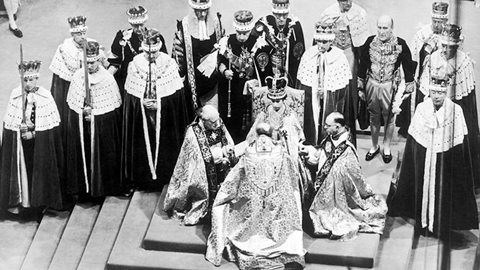Retired bishop Richard Harries shares his thoughts about Queen Elizabeth II, who died a year ago on 8th September 2022
A sense of personal loss
Everyone anticipated that when her Majesty Queen Elizabeth II died there would be a great sense of loss, but the extent and depth of the national grief when she did so was quite extraordinary. So many people clearly felt a personal connection with her and experienced a sense of loss. Even staunch republicans recognised and praised the moral strength of her character.
Those qualities were rooted in, and grew out of, her serious Christian faith.
Gracious hospitality
Imagine inviting every diocesan bishop to spend a weekend with you at some point in their ministry. Not my idea of fun, you might well say. However, this is what the late, much loved Queen did. Every year in January at Sandringham a bishop stayed en famille, sharing meals and games.
This was just one example of the gracious care which Queen Elizabeth II gave to the Church. But it went far beyond this of course. Every Sunday would find her at church somewhere or other. As Graham James, a former Bishop of Norwich has put it:
“When I observed the huge crowds at Sandringham watching the Queen go to church, it was clear that they did not expect that she might have a lie-in that Sunday. The Queen seemed to do a lot of vicarious churchgoing for the nation.”
Read more:
We mourn the Queen, but not as those without hope
How the Queen turned problematic colonialism into a positive Commonwealth
My weekend with Queen Elizabeth II
Atheist says Queen’s funeral was ‘empty and platitudinous’. I disagree.
Personal faith
It is also crystal clear from the many broadcasts that the Queen delivered over the years that this church going was no mere formality. It reflected a deep Christian faith. In one broadcast she affirmed:
“To many of us our beliefs are of fundamental importance. For me the teachings of Christ and my own personal accountability before God provide a framework in which I try to lead my life.”
Then in 2014 she told the nation:
“For me, the life of Jesus Christ, the Prince of Peace, is an inspiration and an anchor in my life. A role-model of reconciliation and forgiveness, he stretched out his hands in love, acceptance and healing.”
Phrases like “my own personal accountability before God” and “an inspiration and anchor for my life” are very strong statements, and not ones she needed to use when speaking to the nation.
Duty and service
As a teenage member of my school cadet corps in 1952 I was one of many in unform lining the route of the three mile Long Walk up to Windsor Castle. I stood there, rifle reversed and pointing downwards, eyes lowered, when, to the sound of slow drumbeat, the cortege of the late King George VI passed slowly by.
There was one word in particular in 1952 that characterised the best of that generation, as displayed so notably by George VI. Duty. You were expected to do your duty, to God, to the country and if you were a citizen, to the monarch. That word seems to have dropped out of current usage. But her Majesty the Queen took it from her father and revealed its reality and crucial importance over 70 changing and challenging years.
Get access to exclusive bonus content & updates: register & sign up to the Premier Unbelievable? newsletter!
To do one’s duty is to accept the responsibilities of the role one inhabits-as a parent to a child, as children to parents, as citizens to the country, as employers to employees, and vice versa, as Christians to the Church to which we belong. To accept the responsibilities of a role, is to put aside one’s personal feelings, ones likes and dislikes, to do what the role requires. It involves daily sacrifice.
We saw this pre-eminently in our much loved late Queen. She did not ask to be monarch, certainly not at that young age. But from the first she recognised it was a responsibility she had to accept and from the first she pledged herself to fulfil its duties, which she did faithfully to the end. Her life was one given over to service.
During the Queen’s lifetime there were momentous changes. But one thing did not change, the sense the Queen had that there was something higher than her personal likes and dislikes, a calling, a vocation to which she strove to be faithful.
Richard Harries is a fellow of the Royal Society of Literature and an honorary professor of Theology at King’s College, London. On his retirement as Bishop of Oxford (1987-2006) he was made a life peer (Lord Harries of Pentregarth). He is the author of many critically acclaimed books, including Majesty: Reflections on the life of Christ with Queen Elizabeth II. A much loved voice on BBC’s Today programme he has broadcast ‘Thought for the Day’ for more than 50 years.























